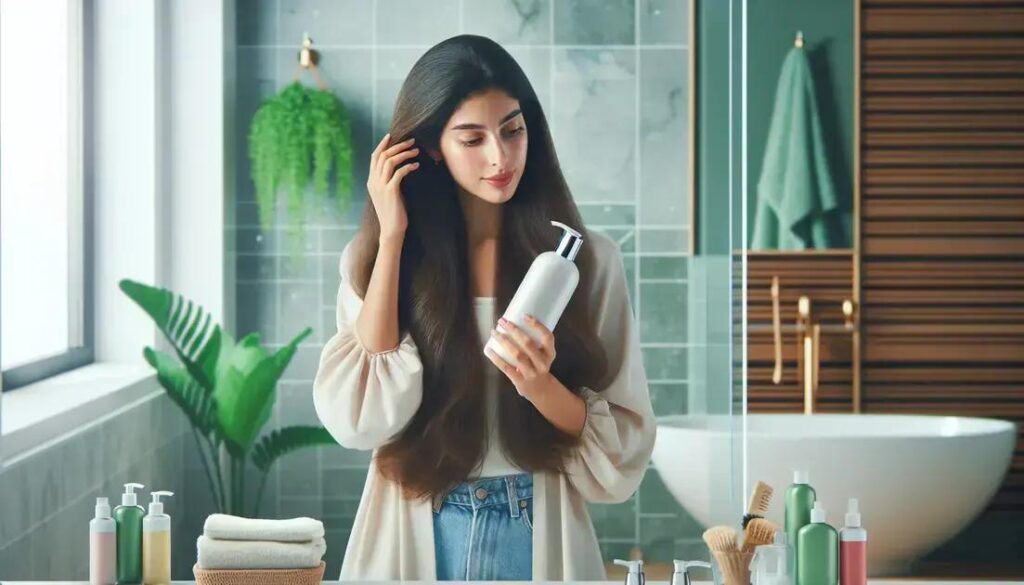Hey there, lovely ladies! Let’s dive right into a question that’s been buzzing around beauty circles: should conditioner be applied to the scalp? It’s a topic that often leaves many of us scratching our heads (pun totally intended). Whether you’ve got luscious locks or are battling a bit of dryness, understanding how and where to apply conditioner can make a world of difference in your hair care routine. In this post, we’re going to explore the ins and outs of conditioner application, bust some myths, and give you the lowdown on what your scalp really needs. So, grab your favorite drink, get comfy, and let’s unravel this hair care mystery together!
By the time you finish reading, you’ll know exactly how to treat your scalp and hair with the love they deserve. We’re talking about healthier hair, less breakage, and maybe even saving a few bucks on products you don’t really need. Plus, I’ll share some expert tips and tricks that’ll have you flaunting your hair like you just stepped out of a salon. So, are you ready to transform your hair game? Let’s get started!
Understanding Your Scalp: The Foundation of Hair Health
What Does Your Scalp Really Need?
Your scalp is more than just the base for your hair; it’s a living, breathing part of your body that needs care and attention. But what does that mean? Well, the scalp produces natural oils, also known as sebum, which are essential for keeping your hair moisturized. However, too much oil can lead to greasiness, while too little can cause dryness and flakiness. Understanding this balance is key to knowing whether conditioner should touch your scalp.
The Role of Sebum
Sebum is like your scalp’s built-in conditioner. It travels down the hair shaft, providing natural moisture. When you wash your hair, you strip away some of these oils, which is why conditioner is crucial. But should it go on your scalp? That depends on your hair type and scalp condition. Let’s break it down further.
Hair Types and Scalp Care
If you have oily hair, applying conditioner directly to the scalp might not be the best idea. It can weigh your hair down and make it look greasy faster. But if your scalp is dry, a little conditioner can help soothe and hydrate. It’s all about finding the right balance for your unique hair needs.
Common Scalp Issues
Many of us deal with scalp issues like dandruff, itchiness, or sensitivity. If you’re in this boat, it’s important to choose a conditioner that’s gentle and possibly medicated. Ingredients like tea tree oil or salicylic acid can help address these concerns while nourishing your scalp.
Signs You Need to Change Your Routine
Noticing more hair on your brush than usual? Or maybe your scalp feels tight and itchy? These could be signs that your current hair care routine isn’t working for you. It might be time to reassess whether your conditioner is helping or hindering your hair health.
Expert Opinions on Scalp Conditioning
Many hair experts suggest avoiding the scalp when applying conditioner, especially if you have fine or oily hair. However, for those with dry or curly hair, a bit of conditioner on the scalp can be beneficial. It’s all about knowing your hair and experimenting to see what works best for you.
Personalizing Your Hair Care
At the end of the day, hair care is personal. What works for one person might not work for another. Don’t be afraid to try different techniques and products until you find your perfect match. And remember, it’s okay to seek professional advice if you’re unsure!
Applying Conditioner: Techniques and Tips
How to Apply Conditioner Correctly
Applying conditioner might seem straightforward, but there’s actually a bit of technique involved. Start by squeezing out excess water from your hair after shampooing. This allows the conditioner to penetrate better. Apply it from the mid-lengths to the ends, where your hair tends to be the driest.
Should You Condition Daily?
Conditioning daily isn’t necessary for everyone. It depends on your hair type and lifestyle. If you’re washing your hair daily, you might want to condition less frequently to avoid over-moisturizing. For those with dry or damaged hair, more frequent conditioning can help restore moisture.
Leave-In vs. Rinse-Out Conditioners
Leave-in conditioners are great for added moisture and protection, especially if your hair is prone to frizz or damage. Rinse-out conditioners, on the other hand, are perfect for daily use and provide immediate softness and manageability.
How Long Should You Leave Conditioner On?
Most conditioners work best when left on for a few minutes. This gives the ingredients time to penetrate the hair shaft. However, leaving it on too long can weigh your hair down, so stick to the recommended time on the product label.
Choosing the Right Conditioner
Not all conditioners are created equal. Choose one that suits your hair type and addresses your specific concerns, whether it’s dryness, color protection, or volume. Reading labels and reviews can help you make an informed choice.
Natural Alternatives to Conditioner
If you’re looking for a more natural approach, there are plenty of alternatives to traditional conditioners. Coconut oil, apple cider vinegar, and aloe vera are popular choices that can provide moisture and shine without the chemicals.
DIY Hair Masks for Extra Nourishment
Sometimes, your hair needs a little extra TLC. DIY hair masks made from ingredients like avocado, honey, and yogurt can provide deep conditioning and repair. Plus, they’re fun to make and use!
Frequently Asked Questions
Can I use conditioner every day?
Yes, but it depends on your hair type. If your hair is very dry or damaged, daily conditioning can help. For oily hair, try conditioning less often.
Is it bad to leave conditioner in your hair overnight?
Leaving conditioner in overnight isn’t recommended unless it’s a leave-in product. It can weigh your hair down and cause buildup.
How do I know if I’m using too much conditioner?
If your hair feels greasy or limp after conditioning, you might be using too much. Start with a small amount and add more if needed.
Can I use conditioner without shampoo?
Yes, this is known as co-washing. It can be beneficial for curly or dry hair types, but make sure to clarify with shampoo occasionally to avoid buildup.
What happens if you don’t use conditioner?
Without conditioner, your hair might become dry, brittle, and more prone to breakage. It also helps with detangling and managing frizz.
And there you have it, beauties! We’ve covered everything from whether conditioner should be applied to the scalp, to tips and tricks for perfectly conditioned hair. Remember, the key is to listen to your hair and give it what it needs. Don’t be afraid to experiment with different products and techniques until you find your perfect match. If you found this post helpful, share it with your friends or check out our other hair care guides for more tips. Until next time, keep those locks luscious!













